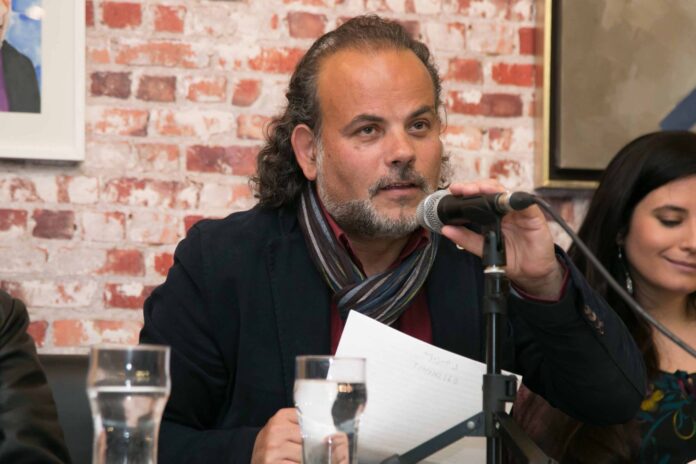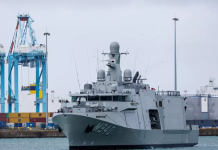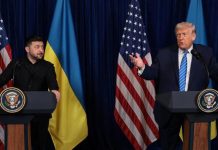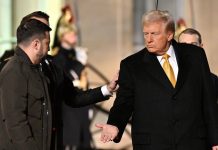(An interview with Greek Poet Elias Papakonstantinou by Adam Siemieńczyk)
Q.We met at a poetry festival in Ukraine. We are now in Athens. There is some power in poetry. What is poetry to you?
A.It was a happy occurrence when we met and this alone possibly depicts the power of poetry, whether it is in communication, in the exchange of views and ideas, in being poetically with each other and of course during our journey and reading the poems, even though they were translated. Poetry has a basis of union and a horizon. It is a sail in time which travels on and through the body of the sea pushed by the air of our souls.
Poetry for me is a lot of things. It is the precious drops of freedom distilled through the centuries. It is what we would like to be while every day we fight first with ourselves and then with everything else so as manage to converse with that minimal ray of perfection through the mists of those uncontrollable passions of our imagination.
Q.If you were to name or describe a place that belongs to poetry, what would it be?
A.Undoubtedly for me, this place would be the Cycladic islands. The Cyclades are poetry: it is in their soil, in their beauty, within their rocks, in their colors of blue, in their history, in everything they produce and of course in their unique light.
Life consists of what is unchanging and at the same time everything is constantly changing. You spoke about people who moved to the area of Rome two thousand years ago and who speak Greek to this day, they keep their customs.
Q. What does emigration mean to you in this context?
A.Life is unpredictable and although many times poetry predicts it, it is ahead of events. What appears not to change seems to be the mountains and the mentality of people. But through time or timelessness, everything more or less changes either slowly or lightning fast. People living in some areas of southern Italy are Greeks with origins from antiquity or even the Byzantine era. We have some great ancient philosophers, such as Pythagoras, but also ordinary citizens who arrived and settled in this corner of the earth to teach culture and to find a better future. From antiquity until today there is a migratory flow, for a variety of reasons. I hope that people will start to reduce the hatred within themselves, the pettiness and recklessness and add vision, love, justice and constructive imagination, so that there will be no more immigrants who leave their land under violent circumstances.

At the same time, I believe that with good, responsible and serious management, any advanced state can withstand a large volume of immigrants, observing those laws which are made for the good of the people and not out of economic interest. There should be a measure for all things, as the ancient Greeks, where “all” includes the whole world, not just the Greeks.
Q.What are your plans? How does poetry come to life after the lockdown?
A.My plans may be many, but I do not know how many will be realized. First and foremost I believe I will continue fighting every day as much as I can, even where it may seem impossible, for the greatest revolution of life, that of love, either through poetry or through everyday acts of humanity.

Now, for my literary projects, first of all I want you to know that in 2021 I published two books (another one is expected by December) whose focus is poetry and prose. We are already recording a new cd which will consist of nine songs, my lyrics and poems set to music, with my collaborator, performer, musician and French teacher Teti Kasionis. The CD will be in book – CD form and will include, along with the nine songs, around 30 of my poems. I would also like to note that the songs will be translated and sung in French.
My next plan is a new book of poetry with about 25 long poems, each divided into small sections. I will also try to publish a fairy tale. I have over eighteen unpublished works and sometime maybe they too may be published.
As far as the musical events that I usually organized with distinguished and good friends are concerned, I believe that we will get back into this process, which had stopped due to the coronavirus. As vice-president of the Panhellenic Union of Writers, I have to point out that we have organized extremely successful events in recent times which I believe were the stepping-stone for re-entering the river of the literary flow of events. We will definitely continue in the same rhythm with events and poetry competitions.

Poetry never lost its rhythm and during the time of lockdown, I wrote two books. What is slowly coming back is the gathering of poets, the book presentations and the gathering of literary groups in various places, things that we have really missed. Whether with lockdown or not, poetry has a way of finding its way: it is like water with its continuous flow, which cannot be imprisoned and which has no borders.
Elias Papakonstantinou was born in Desfina, Fokidos. He is vice president of the Panhellenic Writers’ Union, member of the Society of Greek Writers, member of the Italian Literary Association “Dante Alghieri”, founding member of the cultural institution “Horizons”, founding member of the cultural association “Technochorafo” and member of the “Hellenic Amfiktionia”. He has published 8 books, poetry, short stories and lyrics for songs. His poems have been translated into Italian, French, English, Spanish, Polish, Ukrainian and German. He has also taken part in many poetry anthologies. His poems can be found in the literary encyclopedia Haris Patsis and in the encyclopedia of letters and arts of the Amfiktionia Hellenism. Many have been set to music by the composers such as Nikos Fylaktos, Areti Kokkinou, Krinio Nikolaou, Lino Kokoto, Filippo Peristeri, Chryssa Kottaki, Niko Pitloglou, Vassilis Andrikopoulos and Teti Kasioni. His article on poetry and especially on Greek poetry was included in a book published by the University of Kiev in 2019.






